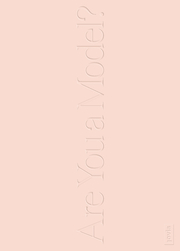Detailansicht
Are You a Model?
On an Architectural Medium of Spatial Exploration
ISBN/EAN: 9783986120726
Umbreit-Nr.: 1357277
Sprache:
Deutsch
Umfang: 200 S., 39 farb. und s/w Abb.
Format in cm:
Einband:
Paperback
Erschienen am 04.06.2024
Auflage: 1/2024
- Zusatztext
- Are You a Model? erkundet das Modell als architektonisches Werkzeug und Praxis. Der Band betrachtet Architekturmodelle nicht in starren Kategorien, sondern nähert sich ihnen durch Fragen wie: Was bestimmt die Funktionen und Wirkungskräfte eines Modells? Wann im Entwurfsprozess entfaltet es seine Kraft und wann hat es seinen Zweck erfüllt? Ausgehend von neun übergreifenden Fragen vereint dieses Buch interdisziplinäre Stimmen aus Architektur, Kunstgeschichte sowie architektonischer und kuratorischer Praxis und Software Engineering. 31 Beiträge verflechten Perspektiven aus verschiedenen Regionen und Disziplinen, und suchen dabei nicht nach abschließenden Antworten, sondern offenbaren überraschende Gemeinsamkeiten. Modelle werden hier somit nicht nach Entstehungszeit, Genre oder Material klassifiziert, sondern als epistemologisch vielfältige Praxis verstanden.
- Autorenportrait
- Anna-Maria Meister is an architect, historian, and professor of architecture theory at KIT Karlsruhe, as well as co-director of the saai archive and leader of the Lise Meitner Research Group at the Kunsthistorisches Institut in Florenz (KHI) - Max Planck Institute. Meister works at the intersection of the histories of architecture, science, and technology, focusing on the interdependencies of processes of design with the design of processes with an emphasis on their political, social, and aesthetic consequences. She is co-curator of the international research project Radical Pedagogies and co-editor of the book of the same name (2022). Teresa Fankhänel is an associate curator at the Eli and Edythe Broad Art Museum at Michigan State University and editor-in-chief of the Architectural Exhibition Review. She was a curatorial assistant for the exhibition The Architectural Model (DAM, 2012) and has published two books on models (The Architectural Models of Theodore Conrad (2021) and An Alphabet of Architectural Models (2021)). Lisa Beißwanger is a historian of art and architecture focusing on the twentieth and twenty-first centuries. Her main topics of research include the history of performance art and its interfaces with architecture, as well as the educational architecture of the long 1960s. She is currently assistant professor at the University of Koblenz. Previously, she was a research assistant at the Department of Architecture at the Technical University of Darmstadt. Chris Dähne researches the history and theory of architecture, media, and technology. She is a postdoctoral researcher in the LOEWE-Cluster Architectures of Order. Practices and Discourses between Design and Knowledge at Goethe University in Frankfurt and in the DFG project BAUdigital at TU Darmstadt. She recently published the book Utopia Computer. The New in Architecture? with Nathalie Bredella and Frederike Lausch. Christiane Fülscher is professor for Architecture History, Theory, and Preservation at Dortmund University of Applied Sciences and Arts. Trained as an architect and art historian, her research focuses on the cultural as well as socio-political objectives of architecture as well as the history of architectural education at the beginning of the twentieth century. She is author of the monograph Deutsche Botschaften. Zwischen Anpassung und Abgrenzung (2021). Anna Luise Schubert is an architectural researcher and cultural worker. As a board member of the Centre for Documentary Architecture, she co-conceived its online archive project documentary-architecture.org, organized the exhibition series The Matter of Data, and contributed to internationally presented films such as the eight-screen video installation Deep White (35 min, 2019). She currently coordinates the Lise Meitner Research Group at the Kunsthistorisches Institut in Florenz - Max Planck Institute.
